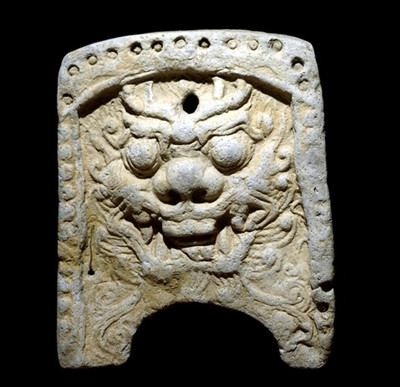(单词翻译:单击)
It's got a squashed nose, bulging eyes, small horns, and abundant whiskers. In fact, the face looks like a cross between a Chinese dragon and a Pekingese dog, and not friendly at all! It looks a bit like an oriental gargoyle, and that is pretty well what it was.It would have had a similar position to a gargoyle, high up on a temple or a grand house. The features of the face when you look at them closely are pretty rough, and it's obvious that it's been made by pushing the wet clay into a fairly simple mould. This is clearly a mass-produced object. But that is why it's so interesting, because this is just one of tens of thousands designed to cover roofs that would once have been thatched, but in prosperous Silla Korea, were tiled with objects like this.
阔鼻,鼓眼,细角,胡须很多,看起来像是中国龙与京巴的混合体。它十分类似同期产于中国唐朝的瓦片,但它绝非中国制造。中国龙通常有一张大嘴,而这个动物的嘴小且具有攻击性。整个瓦片的造型也颇为粗犷,一点儿也不中国。它看起来就像个东方的滴水兽,而这也正是它的用途。它曾被安放的位置与西方的滴水兽类似,高踞于庙宇或豪宅的屋顶。瓦片的面部细节极为粗糖,显然只是将湿土按压进一个简单的模具制成的。它很明显是大规模量产的瓦片之一,而这正是我们对它感兴趣的原因。人们的屋 顶曾经只用茅草覆盖,而今在繁华的新罗,人们制造出成千上万件类似的瓦片,覆盖在屋顶之上。
Why did the Silla want to build such a grand capital, and why did they need so many new houses? The Korean specialist Jane Portal explains:
朝鲜半岛专家白珍博士解释了新罗为何要将庆州修建得如此繁华,又为什么需要如此多的新建筑:
"The city of Kyongju was based on the Chinese capital Chang'an, which was at the time the biggest city in the world, and Kyongju developed hugely once Silla had unified the Korean peninsula, or most of it. A lot of the aristocrats from the kingdoms which were defeated by Silla had to come and live in Kyongju, and they had magnificent houses with tiled roofs. And this was a new thing, to have tiled roofs, so this tile would have been a sort of status symbol for them."
庆州是模仿中国的首都长安建造的。长安是当时世界上最大的城市之一。新罗征服了朝鲜半岛的大部分地区之后,庆州立刻飞速发展起来。许多战败国的王公贵族来到庆州居住,他们需要覆瓦的豪宅。瓦顶建筑对当时的庆州来说是新鲜事物,因此这样的瓦片是某种地位的象征。



